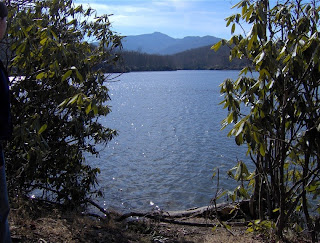I went to school in Boone, North Carolina, at App State. It was great, and sometimes I miss it.
A beautiful mountain lake in North Carolina is pretty much the perfect place for a picnic. Or a hike. Or just sitting around taking pictures of something.
It's summer, and a great time for the mountains. Ten degrees or so cooler than the rest of the state, they're bursting with green and trailing beautiful flowers everywhere.
Then there's the hiking, which around there sometimes feels like scaling sheer surfaces for the fun of it. (Okay, most of the paths aren't really that steep. Just a few.) This happens to be how I like my hikes: a good adventure, of the sort that makes me and my adventuring party feel like we've collected XP.
I'm expecting to drop by the mountains sometime this summer. I want to rock-climbing up a mountain river, and ogle the scenery, and maybe watch the stars on a midnight picnic on the Blue Ridge Parkway with my friends. Can't wait--although I don't live there anymore, visiting the NC mountains always feels a bit like coming home.
Where's your "coming home" place? What do you love about it?
A beautiful mountain lake in North Carolina is pretty much the perfect place for a picnic. Or a hike. Or just sitting around taking pictures of something.
It's summer, and a great time for the mountains. Ten degrees or so cooler than the rest of the state, they're bursting with green and trailing beautiful flowers everywhere.
 |
| Don't worry, Snowpuff, we're almost at the top! |
Then there's the hiking, which around there sometimes feels like scaling sheer surfaces for the fun of it. (Okay, most of the paths aren't really that steep. Just a few.) This happens to be how I like my hikes: a good adventure, of the sort that makes me and my adventuring party feel like we've collected XP.
I'm expecting to drop by the mountains sometime this summer. I want to rock-climbing up a mountain river, and ogle the scenery, and maybe watch the stars on a midnight picnic on the Blue Ridge Parkway with my friends. Can't wait--although I don't live there anymore, visiting the NC mountains always feels a bit like coming home.
Where's your "coming home" place? What do you love about it?














